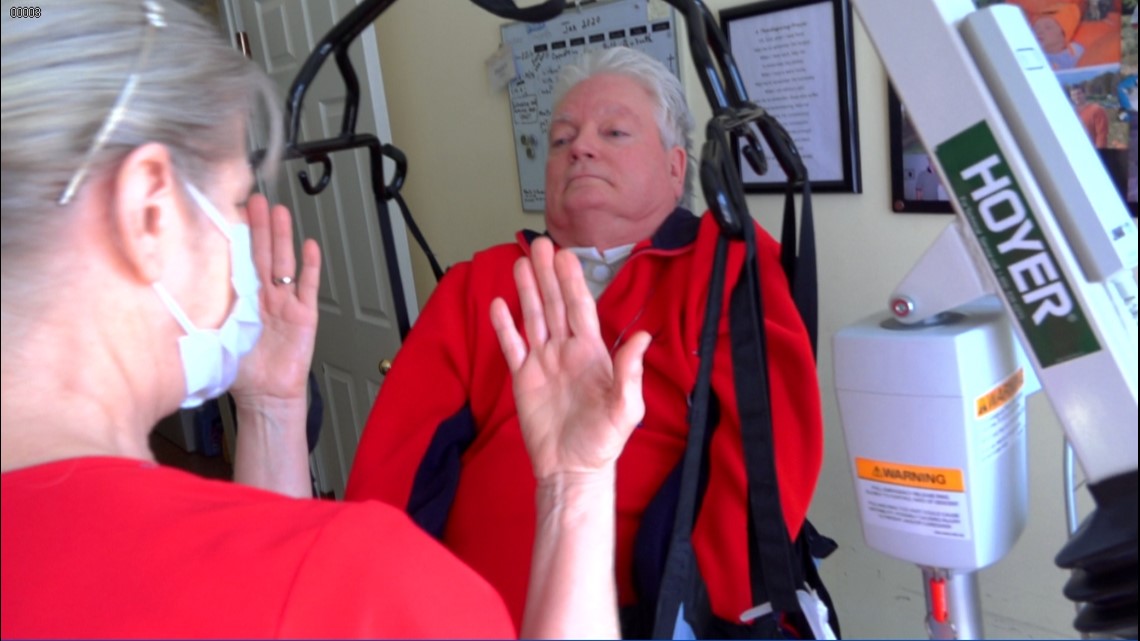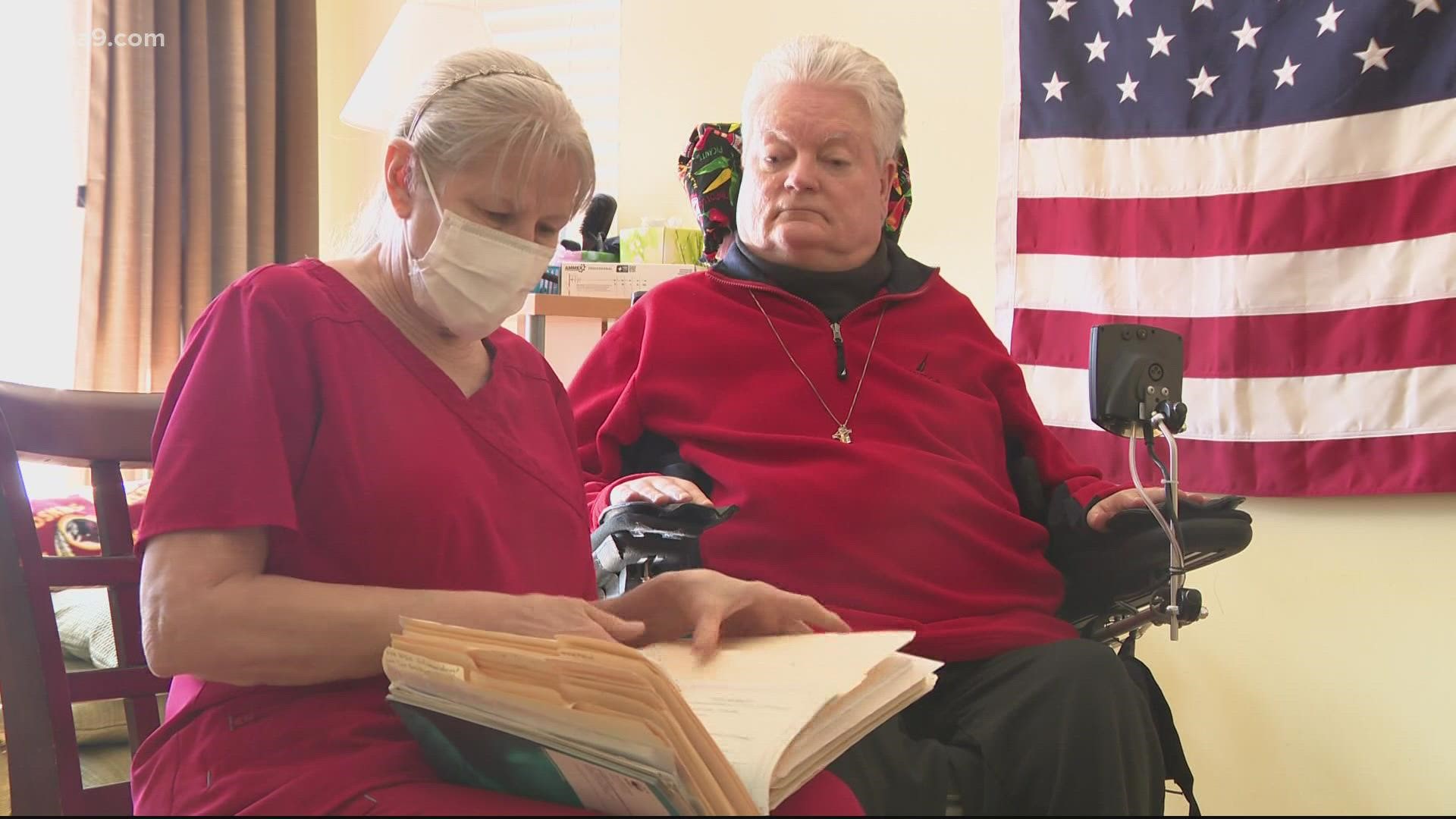BETHESDA, Md. — A North Bethesda man who spent a quarter-century in service to the U.S. government says he’s battling that government for a chance to keep living.
Patrick Durkin -- paralyzed by a wave in Ocean City in 2009 -- says Medicare and Medicaid are forcing him out of his home and into a nursing facility where he’s convinced he’ll die.
He's still hoping for a miracle.
"Right now he's off the ventilator for the night," says nurse Judy Pangborn, just before she suctions out his throat through his tracheotomy.
Patrick Durkin has so much life for a man who struggles even to breathe.
"Feels great, Judy, very good," he says after she finishes his treatment.
Durkin spent 28 years as a special agent for the IRS and the FDA, where he was recognized for helping keep counterfeit cancer drugs from making their way to American pharmacies.
"It’s probably my proudest accomplishment," he said.
In 2009, he was body surfing in Ocean City and got slammed by a rogue wave. It’s a story he tells in a public service video for the National Weather Service. "And it crashed and knocked my forehead into the sand," he said.
He describes floating face down in the water until his fiance rolled him over and dragged him to shore.
Durkin was left a quadriplegic, paralyzed from the neck down, but still able to feel pain.
"See the shoulders spasming, if you pull it out too far? Probably just be easy with it," said Pangborn, whose agency is called Samaritan's Way Nursing.
Pangborn has cared for him tenderly for a dozen years, proud that it's been seven years since he's had to even go to the hospital.
"Judy said she was not only going to keep me alive, but she was going to give me a life," said Durkin. And she has, taking him in a wheelchair lift van to hockey games and family dinners.
"It's fabulous, what I can do in this chair," sipping and puffing through a straw that directs his wheelchair to turn left and right, back and forth.
For a decade, Durkin paid his nursing agency from his pension, his savings, private insurance, and long-term care insurance. But when he turned 65 he had to sign up for Medicare. And Medicare will not pay for 24-hour in-home care.
"I am very afraid of going into a nursing facility. ... It will lead to my death," he said. Two doctors testified that he likely wouldn't survive if he has to go to a nursing facility.
Durkin has exhausted his savings to qualify for Medicaid. But, get this: He says a Maryland administrative judge told him he had to be in an institution to apply for a waiver for Medicaid to pay for the 24-hour in-home care he needs.
It’s like a Catch-22. He’s got to be in a nursing home to apply to come home, said Pangborn. He can’t apply from in own home to stay there, she said. He’s got to go into a nursing home first.


Andy Owen, spokesman for the Maryland Department of Health, says privacy laws prevent him from talking specifically about Durkin's case, but he said it’s a priority to keep people in their own homes if they want to stay. But “individuals must meet a cost-neutrality test.”
Pangborn says she could keep caring for Durkin for thousands of dollars a month less than sending him to a nursing facility. She says she and her nurses could care for him in his own home for $16,000 to $18,000 a month. She estimates a bed in a skilled nursing facility would cost at least $21,000 a month -- if they could find an available bed. There are long waiting lists for space for Medicaid patients.
Because Medicaid’s not paying, Pangborn has been caring for him almost for free for the last 12 months.
"I’ve cried. I’ve screamed. I’ve yelled ... I just can’t afford to stay here," she said, fighting back tears. "I feel like I’m putting a family member out the door."
But she said she'll lose her business if she keeps caring for him, usually putting in seven shifts a week, for free.
A lawyer for AARP Foundation says forcing Durkin out of his home and into an institution would violate the Americans With Disabilities Act.
“The idea of putting somebody into a nursing facility in order to get the care that he needs on its face violates the Supreme Court precedents in Olmstead versus LC, which is, to me and to other advocates the Brown versus Board of Education for people with disabilities," she said.
"This strong man who has fought drug dealers is reduced to tears because of what this Medicaid law is going to force him to do. It’s pitiful. It’s pitiful," said Anne Engel, one of dozens of volunteers from St. Jane Francis de Chantal Catholic Church in Bethesda who are trying to help him.
Durkin says he never quits. "I’m still optimistic that I’m going to stay home. God willing," he said.
But he needs a miracle.
If you can help, a couple of efforts are underway to aid Durkin. You can find a GoFundMe set up by Durkin's family and friends here. There is also a campaign with HelpHopeLive to help to pay for uninsured medical expenses associated with catastrophic injury.

